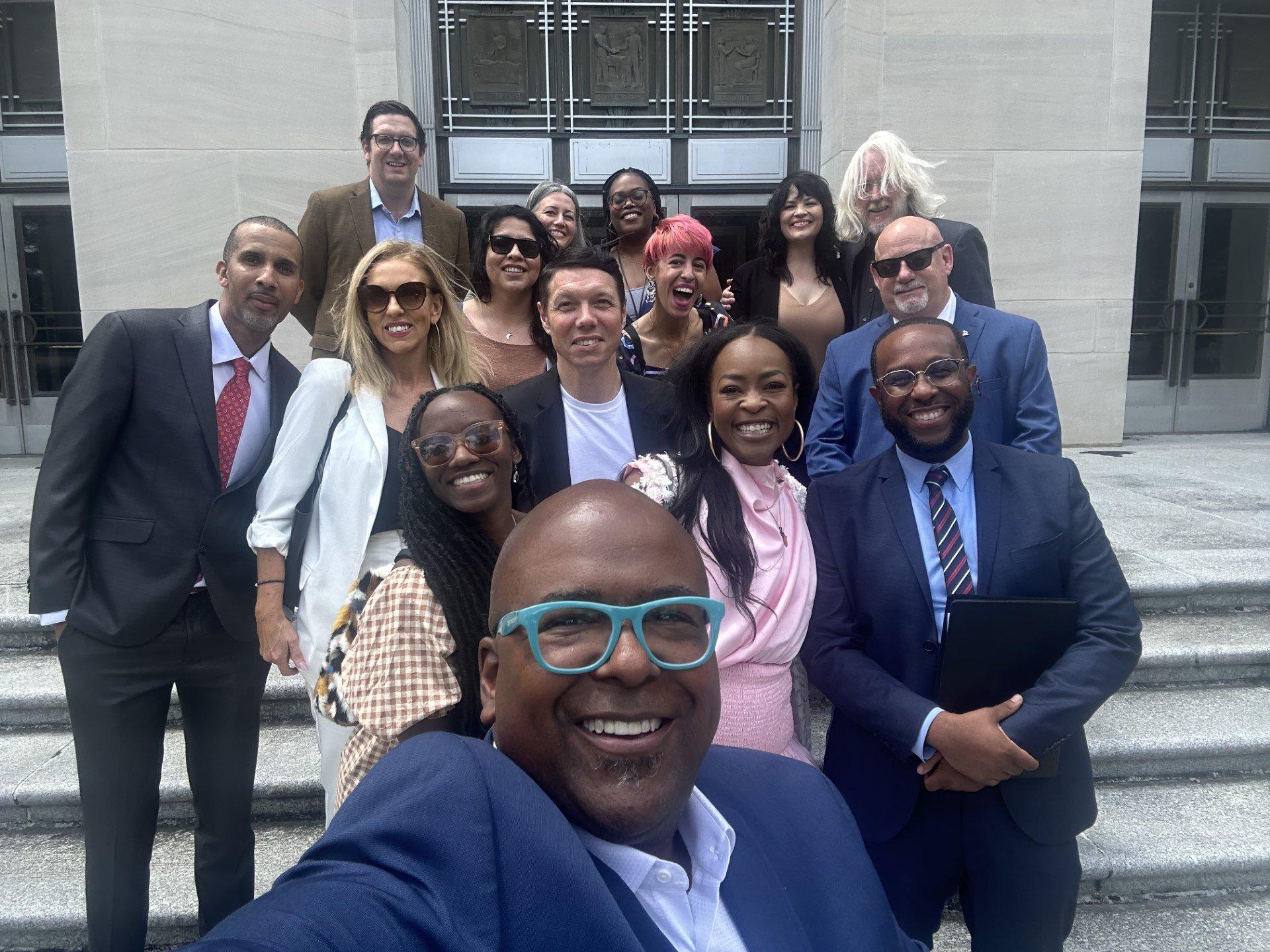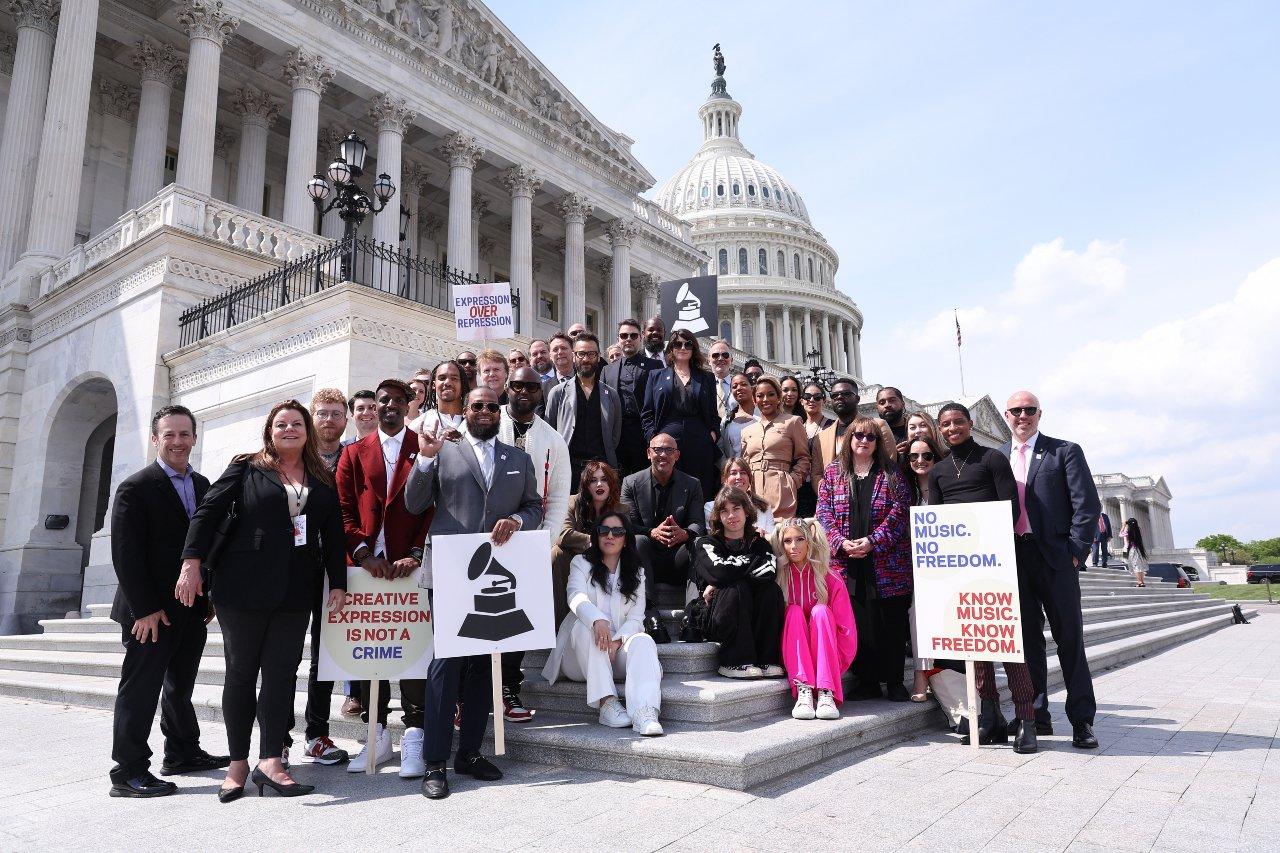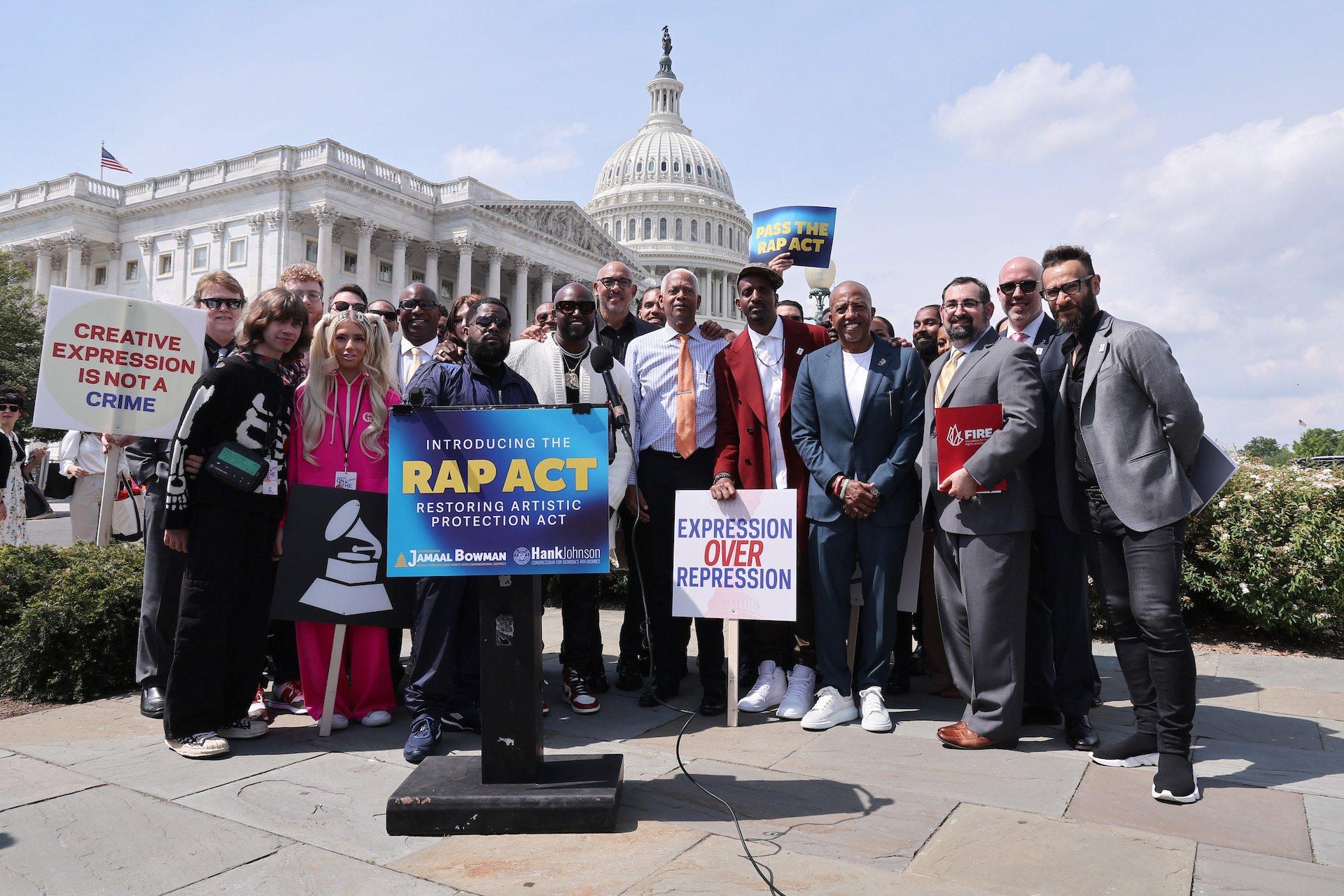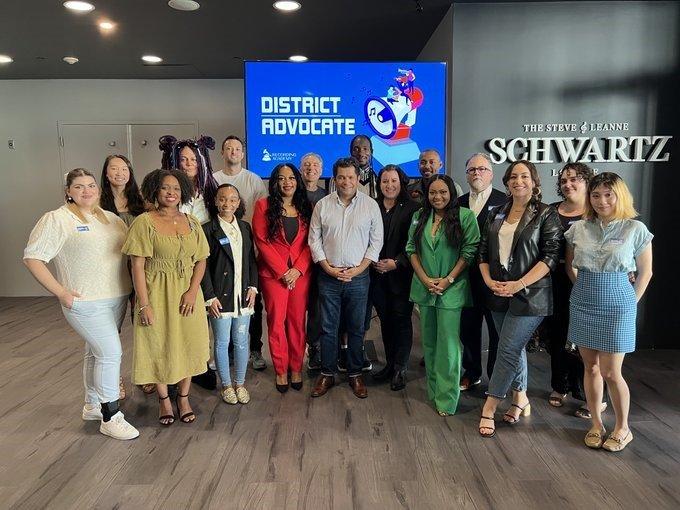Photo: Sean Ardoin

news
The Restoring Artistic Protection (RAP) Act Takes Effect In Louisiana
Louisiana became the second state in the nation to enact a law that protects a creator’s right to artistic expression by limiting the use of creative works. Here’s what that means for all music people.
On August 1, with the enactment of the Restoring Artistic Protection Act (HB 475), Louisiana became the second state in the nation to enact a law that protects a creator’s right to artistic expression by limiting the use of creative works, such as lyrics, as evidence in criminal court cases.
Since the bill’s introduction in March, the Recording Academy has been working closely with Louisiana State lawmakers, including State Rep. Tanner Magee who was the original bill sponsor, to help ensure its passage.
On April 20, the Recording Academy’s Memphis Chapter even hosted a Louisiana Music Advocacy Day in Baton Rouge where Academy members met with state lawmakers in support of the bill. Following the Advocacy Day, HB 475 passed out of the House on April 26 before clearing the Senate on June 4. And, on June 12, the bill was signed into law by Governor John Bel Edwards with an effective date of August 1.
The passage of HB 475 marked a significant milestone in the nationwide effort to protect creators’ First Amendment rights. Upon the new law taking effect, Harvey Mason jr., CEO of the Recording Academy said, “Today we celebrate an important victory for music creators in the state of Louisiana. Silencing any genre or form of artistic expression is a violation against all music people. As the second state to enact a law protecting creative expression, Louisiana continues to build momentum in the fight to safeguard artists’ creativity nationwide. We extend our gratitude to Rep. Tanner Magee for his leadership on this issue and to Governor Edwards for recognizing the importance of protecting artistry and signing the Restoring Artistic Protection Act into law.”
Besides Louisiana, California is the only other state to have a law to protect music creators from their lyrics being used against them in a criminal trial. However, the Recording Academy has continued to work in many other states, such as New York and Missouri, on similar legislation.
In addition to the Recording Academy’s statewide efforts, the Academy has also been working closely with Members of Congress to get a federal bill on this issue passed. On April 27, during the Recording Academy’s GRAMMYs on the Hill Advocacy Day, the federal Restoring Artistic Protection Act (H.R.2952) was reintroduced in the U.S. House of Representatives.
In addition to its re-introduction, the Recording Academy joined the bill’s cosponsors, Rep. Hank Johnson (D-GA) and Rep. Jamaal Bowman (D-NY) for a press conference outside of the U.S. Capitol to announce the bill’s reintroduction.
Keep checking the Recording Academy’s Advocacy site for more information about how the world’s leading society of music people fights for the music community!

Courtesy of Recording Academy® Photo by Paul Morigi by Getty Images © 2023
feature
Restoring Artistic Protection (RAP) Act Reintroduced In Congress: Carry The Fight Forward With These Inspiring & Galvanizing Quotes From The 2023 GRAMMYs On The Hill Awards & Advocacy Day
While the 2023 GRAMMYs On The Hill Awards and Advocacy Day, which highlighted the Restoring Artistic Protection (RAP) Act, may have come and gone, carry the fight forward with these impactful expressions from the two-day gathering.
It was emotionally stirring to stand before the U.S. Capitol on April 27. It was Advocacy Day, the day immediately following the 2023 GRAMMYs On The Hill Awards, and members of congress and music industry leaders met at a press conference to announce the reintroduction of the Restoring Artistic Protection (RAP) Act, while also reflecting on what hip-hop means to them.
"Imagine being a young, Black teenager in New York City and watching the movie Do the Right Thing, directed by Spike Lee. The story of Radio Raheem. The story of Sal's Pizza. The story of no Black people on the wall," said Rep. Jamaal Bowman (D-NY), who along with Rep. Hank Johnson (D-GA) introduced the bill on that glorious spring day.
"Now, I'm in Congress in 2020, walking around asking, 'Where the hell are all the Black people on the wall?' because of a movie like that," the congressman continued. "I wouldn't be here if it wasn't for Eric B. & Rakim, Big Daddy Kane, KRS-One, X-Clan, Public Enemy, Brand Nubian."
Rep. Bowman went on to express how Rakim's philosophy of self-knowledge provided a foundation for his thinking. But then, a moment of startling truth struck, one totally apropos to the occasion for this gathering.
"I could differentiate between N.W.A.'s music and how I should behave in society," Rep. Bowman stated. "I didn't want to go mimic what they were saying. I knew it was them expressing what was going on in their community and them sensationalizing certain things.
"That's what artists do. That's what Stephen King does. That's what George Lucas does," he added. "Pick your art, pick your director, pick your writer, pick your author — this is what they do."
The Restoring Artistic Protection Act is a bill that would limit the use of song lyrics as evidence in courtrooms nationwide; while it applies to all styles of artistic expression, it disproportionately affects artists who are people of color, particularly members of the hip-hop sphere.
While GRAMMYs On The Hill, which advocated for the bill, may have come and gone, carry the fight forward with these impactful quotations from the Advocacy Day press conference and the GRAMMYs On The Hill red carpet.
It’s a really slippery slope. If you start allowing art to be used as evidence, it’s going to change the nature of how people filter the way they think and write. It’s going to change their storytelling ability. When you’re creating, you have to be free to tell a story — to create magic, to dream. This isn’t reality TV. These aren’t documentaries. These are things that are sometimes escapism. Sometimes, they’re fantasies. They’re aspirational. There are a lot of reasons why people write songs, and we can’t have these lyricists or writers held liable for things they say in the middle of a piece of art.
— Harvey Mason jr., CEO of the Recording Academy
[The First Amendment] is the foundational stone of democracy. If you don't have freedom of expression, if you don't enable artists to create without fear of prosecution or censoring, you don't have democracy.
— Panos A. Panay, President of the Recording Academy
The government should not be able to silence artists simply because they write, draw, sing, or rap about controversial or taboo subjects.
— Rep. Hank Johnson (D-GA)
As a music creator myself, I know how important it is that we safeguard artists' freedom to create at all costs and to work to eradicate the biases that come with the unconstitutional practice of using lyrics as evidence, which disproportionately affect artists of color and penalizes the creativity of Black and Brown creatives. This discriminatory practice must come to a halt, and not only for artists making rap music. Criminalizing creative works has a dangerous impact on all genres of music, on all forms of creative expression from hip-hop to jazz to classical dance to literature.
— Rico Love, Vice Chair on the Board of Trustees of the Recording Academy and Black Music Collective Chair
You know, rap music actually is folk music, because folk music is the voice of the people. And this is the voice of a community of people that must never be stifled, must never be muzzled. [It] must never be a rolling stone, a rabbit hole into more and more censorship because people are afraid that if they say something, it might be admissible in court and it might be held against them — when, actually, it falls under the First Amendment and it is their right to express themselves because they're expressing the voice of the people.
— Actress, comedian, writer, and president of SAG-AFTRA Fran Drescher
So let's not just simply think that rap artists deserve to be prosecuted based on their lyrics and nothing will happen to my music or to my graffiti or to my poetry, to my song in a different genre, or to my play or my TV show, my pilot. Let's all come together at this point and nip it in the bud while we still have a chance to do so. If we let it keep going, the monster will just get bigger and bigger.
— Rep. Hank Johnson (D-GA)
I know this may come as a surprise, but sometimes, art depicts violence. Whether it's Mario Puzo's The Godfather, Quentin Tarantino's Reservoir Dogs, Bob Marley's 'I Shot the Sheriff,' Johnny Cash's 'Folsom City Blues' — it's all protected, all of it. Ice-T isn't a 'cop killer' — nor is he a cop, despite now playing one on TV.
— Joe Cohn, director of FIRE's Legislative and Policy department
Our creativity is our humanity and our art is our air. If you crush our art, you take away our air. You choke us off from breathing and participating in a democracy.
— Rep. Jamaal Bowman (D-NY)
Hip-hop is the most significant cultural force on the planet. It grew out of the pain, the struggle, the disenfranchisement, and joy of young Black America. Hip-hop affects the voices of the unheard and the most often under attack just for our existence. We are clear that through hip-hop culture, many have broken cycles of intergenerational poverty. Therefore, we are not confused by this attack on our culture. We are clear that this is another angle to ensure that the prison-industrial complex has a steady flow of subjects to bear out the intended design. This did not lose us.
— Acclaimed rapper and co-chair of the Black Music Action Coalition Willie "Prophet" Stiggers
Hip-hop is what made me. It's who I am. If you cut me open, I bleed the culture. From my time as a teenager, from running Def Jam for more than 20 years or leading Electra 300 today, I've seen this issue across nearly four decades in the music business. And so, to paraphrase Fannie Hamer, I'm sick and tired of being sick and tired of the same damn thing.
— Kevin Liles, CEO, Chairman of the Board, Co-Founder of 300 Entertainment
We cannot stop at today. We have to continue to fight this fight every single day because our First Amendment dictates that we have the freedom to speak and express ourselves.
— Rep. Jamaal Bowman (D-NY)

Photo: Courtesy of Recording Academy ® | Photo by Paul Morigi by Getty Images © 2023
news
Recording Academy And U.S. Congress Leaders Announce The Reintroduction Of The Restoring Artistic Protection (RAP) Act, Leading The Federal Effort To Limit The Use of Song Lyrics In Court And Legal Cases
Following the 2023 GRAMMYs on the Hill Awards, Recording Academy leaders and members joined Congressmen Hank Johnson (D-GA) and Jamaal Bowman (D-NY) in Capitol Hill to announce the reintroduction of the Restoring Artistic Protection (RAP) Act.
Today, Recording Academy leaders and members joined Congressmen Hank Johnson (D-GA) and Jamaal Bowman (D-NY) at a press conference on Capitol Hill to announce the reintroduction of the Restoring Artistic Protection (RAP) Act. Intended to protect artists' freedom of creative expression, the RAP Act would limit the use of song lyrics in court — a common practice that disproportionately affects rap and hip-hop artists. Artists and industry advocates, including Recording Academy CEO Harvey Mason jr. and Recording Academy Board of Trustees Vice Chair and Black Music Collective Chair Rico Love, shared their views on the importance of passing this legislation and ensuring all artists can create freely without fear of their work being criminalized. Watch the full press conference below.
The announcement comes on the heels of the Recording Academy's Annual GRAMMYs on the Hill, a two-day event that honored 13-time GRAMMY winner Pharrell Williams, Senate Majority Leader Chuck Schumer, and Senator Bill Cassidy for their stalwart support of music creators and connected music creators with members of Congress from both sides of the aisle to advocate for the RAP Act, the Help Independent Tracks Succeed (HITS) Act, the American Music Fairness Act (AMFA), and reform of the live event ticketing marketplace.
"GRAMMYs on the Hill has been bringing music creators to Capitol Hill for more than 20 years to elevate policy issues that impact our community. Today, we're proud to see our Academy members' commitment to advocacy come to life with the reintroduction of the Restoring Artistic Protection Act. We must safeguard artists' freedom to create at all costs and work to eradicate the biases that come with the unconstitutional practice of using lyrics as evidence. We are grateful to Congressmen Johnson and Bowman for their unwavering commitment to music people and look forward to working alongside them to advance this issue." – Harvey Mason jr., CEO, Recording Academy, and Rico Love, Chair, Recording Academy Black Music Collective
"This legislation is long overdue," Congressman Johnson said. "For too long, artists – particularly young Black artists – have been unfairly targeted by prosecutors who use their lyrics as evidence of guilt, even though there is no evidence that the lyrics are anything more than creative expression. When you allow music and creativity to be silenced, you're opening the door for other realms of free speech to be curtailed as well. The government should not be able to silence artists simply because they write, draw, sing, or rap about controversial or taboo subjects. The Restoring Artistic Protection Act (RAP Act) would protect artists' First Amendment rights by limiting the admissibility of their lyrics as evidence in criminal and civil proceedings."
"Rap, hip-hop and every lyrical musical piece is a beautiful form of art and expression that must be protected," said Congressman Bowman Ed.D. "I am proud to introduce the RAP Act alongside Rep. Hank Johnson. Our judicial system disparately criminalizes Black and Brown people, including Black and Brown creativity. For example, Tommy Munsdwell Canady is a young 17-year-old kid serving a life sentence whose conviction heavily relied upon lyrics he wrote. I was deeply moved to hear that Mr. Canady continues to pursue his art in the face of our carceral systems that would otherwise stifle Black art. He is not an outlier. Evidence shows when juries believe lyrics to be rap lyrics, there's a tendency to presume it's a confession, whereas lyrics for other genres of music are understood to be art, not factual reporting. This act would ensure that our evidentiary standards protect the First Amendment right to freedom of expression. We cannot imprison our talented artists for expressing their experiences nor will we let their creativity be suppressed."
There are over 500 documented cases since the 2000s where prosecutors have used lyrics as criminal evidence in court against an artist defendant. A 2016 study by criminologists at the University of California examined whether rap lyrics are evaluated using stereotypes and found that rap was evaluated more negatively than other genres of music, highlighting the possibility that bias against rap lyrics could inappropriately impact jurors when admitted as evidence to prove guilt. To right this wrong, the Recording Academy has spearheaded efforts to protect the First Amendment rights of artists nationwide by working to limit the use of an artist's lyrics — among other forms of creative expression — as evidence in criminal proceedings.
On Sept. 30, 2022, California Governor Gavin Newsom signed the Decriminalizing Artistic Expression Act into law alongside Recording Academy CEO Harvey Mason jr. at a virtual bill signing.
This year, the Academy is working to advance similar legislation in several states, including Louisiana, where HB-475 passed a House vote on April 25; Missouri, where HB-353 recently advanced to the House for a vote; and in New York, where a similar bill passed through the Senate in 2022.
Inside GRAMMYs On The Hill 2023: How The Recording Academy Will Fight For Creator's Rights

Photo: Rodin Eckenroth / Getty Images for the Recording Academy
list
Looking Back On 2022: One Of The Recording Academy’s Most Successful Years In Advocacy
From the PEACE Through Music Diplomacy’s passage into law to the return of District Advocate Day, 2022 was a banner year for Recording Academy Advocacy.
Now that the first week of 2023 has come to a close and preparations are made for the work ahead in the 118th Congress, Recording Academy Advocacy would like to take a moment to look back on the many Academy victories our members helped accomplish for the music community in 2022.
This way, the team aims to celebrate one of the Recording Academy's most successful and impactful years in advocacy.
The PEACE Through Music Diplomacy Act Was Passed Into Law
This victory for music people occurred on Dec. 23 as part of the 2023 National Defense Authorization Act (NDAA). Its passage will use music and music-related global exchange programs as a tool to build cross-cultural understanding and advance peace abroad.
The Fight for Performance Rights Reached Historic Milestones in the House and Senate
The House Judiciary Committee passed the American Music Fairness Act (H.R. 4130) out of committee on Dec. 7. The favorable voice vote — with no recorded votes against the bill — marks the most significant action by Congress on performance rights in the last 12 years.
Read More: The House Judiciary Committee Passed The American Music Fairness Act: What You Should Know
On Feb. 2, the House Judiciary Committee held a hearing on the American Music Fairness Act, allowing lawmakers to hear directly from music creators — including Memphis Chapter Governor Boo Mitchell — on the importance of receiving compensation when their work is played on AM/FM radio.
On May 12, Sens. Alex Padilla (D-CA) and Marsha Blackburn (R-TN) introduced the American Music Fairness Act in the Senate.
This introduction exhibits the bipartisan and bicameral support for establishing a terrestrial performance right for sound recordings and ensuring that all creators are compensated for their work when played on AM/FM radio.
*Rep. Mark Green with Gramps Morgan. Photo: Terry Wyatt / Getty Images for the Recording Academy*
New Legislation Was Introduced to Protect Freedom of Expression
Reps. Hank Johnson (D-GA) and Jamaal Bowman (D-NY) introduced the Restoring Artistic Protection (RAP) Act into the House of Representatives on July 27.
The RAP Act, which is the first of its kind on a federal level, intends to protect a creator’s right to free expression by limiting the use of song lyrics and other creative works as evidence in federal court.
Its introduction marked the beginning of an important fight to protect artists' freedom of expression in all genres.
Advocacy Wins in States Across the Country
On September 30, California Governor Gavin Newsom signed AB 2977, the Decriminalizing Artistic Expression Act, into law, marking the first of its kind to be enacted on a state level. The Recording Academy spent much of 2022 working with California State Assembly and Senate members to ensure its passage and protect artists from having their creative expression used against them in a trial.
***Marsha Blackburn (R-TN) at District Advocate Day. Photo courtesy of the Recording Academy.***
In November, Prop. 28 was on the ballot in California. This measure, which passed with over 60% of the vote, will allocate nearly $1 billion in funding to arts and music education programs in public schools throughout California. The Recording Academy, through both the Los Angeles and San Francisco Chapters, helped secure signatures to ensure Proposition 28 got on the ballot.
*Allen Toussaint. Photo courtesy of the Recording Academy.*
Louisiana:
After years of effort from the Recording Academy, Louisiana Gov. John Bel Edwards signed the Allen Toussaint Legacy Act into law on June 15. Named after the late Louisiana music legend Allen Toussaint, the law protects a person’s “right of publicity” to prevent their image and likeness from being exploited for commercial purposes.
Georgia:
The Recording Academy worked successfully in Georgia throughout the year with key stakeholders like Georgia Music Partners to form the inaugural Joint Georgia Music Heritage Study Committee, a bipartisan committee of state legislators tasked with identifying policy recommendations to strengthen the state’s music ecosystem.
The Recording Academy also worked to pass the Truth in Music Advertising Act and the True Origin of Goods Act, which was signed into law in May.
The CASE Act Took Effect
On June 16, the Copyright Claims Board (CCB) officially began accepting copyright cases following the implementation of the Copyright Alternative in Small-Claims Enforcement (CASE) Act, which was signed into law in 2020 after years of lobbying by the Recording Academy and its members.
This marked a huge victory for independent creators and artists who will be empowered to protect their work.
Second Largest District Advocate Day Yielded Results
Nearly 2,000 Recording Academy members came together for the Recording Academy’s first District Advocate Day in three years. Through nearly 200 meetings, Academy members reached 75% of Congress and covered 45 states (including the District of Columbia) advocating for pro-music legislation including the HITS Act, PEACE Through Music Diplomacy Act, American Music Fairness Act, and the RAP Act.
Read More: District Advocate Day 2022 Is A Wrap. What Was Accomplished, And How Do We Move Forward?
GRAMMYs On The Hill Returned After Three Years
After three years off due to the COVID-19 pandemic, GRAMMYs on the Hill returned for its 20th anniversary honoring Rep. Michael McCaul (R-TX), Rep. Ted Deutch (D-FL), and 5-time GRAMMY winners Jimmy Jam and Terry Lewis. The day after the Awards dinner, GRAMMY winners and nominees took to Capitol Hill to meet with Members of Congress to advocate for pro-music legislation.
The Recording Academy looks forward to continuing this work throughout 2023 — and continuing the fight for all music people worldwide.
